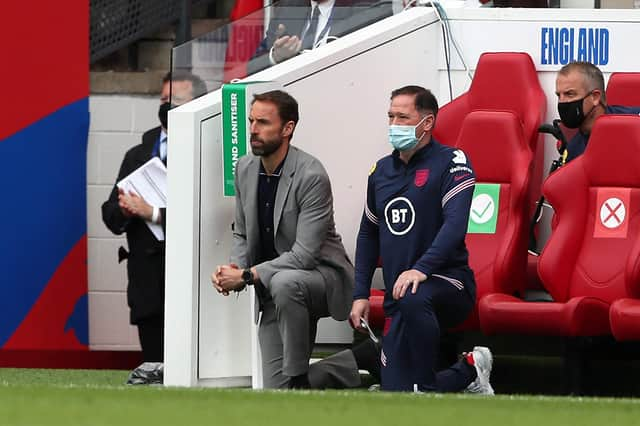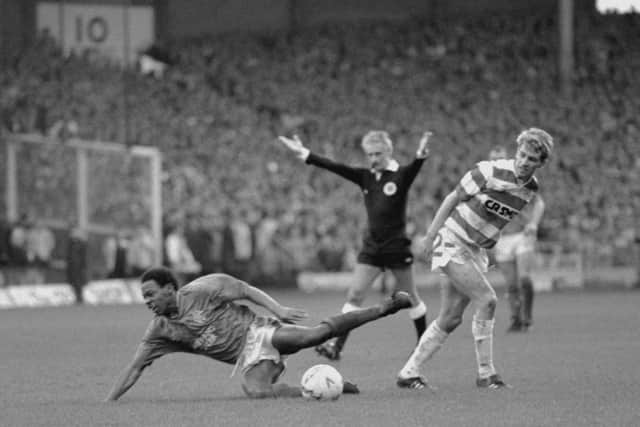Why footballers taking the knee is a win against racism - Euan McColm


Walters - a black man from Birmingham - was, went the gag, actually eligible to play for Scotland on account of the fact one of his ancestors had eaten a missionary. It feels grubby even to recount this dreadful episode.
Two days after signing for his new club, Walters was subjected to the most horrific racism during an Old Firm derby, when Celtic fans made monkey noises and threw missiles. First, a banana was hurled at the player and, by the time the half-time whistle was blown, there were so many items - including a dart - on the pitch that the remainder of the match was delayed while the ground was cleared.
Advertisement
Hide AdAdvertisement
Hide AdThis was not to be an isolated incident. The player was frequently abused while playing and, although much of this was condemned by supporters, fellow pros and members of the media, it was - shamefully - to continue for some time.


Speaking recently about playing in Scotland, Walters revealed just how isolated he was. He couldn’t, he explained, complain during a match to the referee because the attitude in those days was “if you don’t like it, get off the field and they’ll put someone else on and replace you”. If he had complained, said Walters, he’d have been criticised for having a chip on his shoulder and so, he felt, he just had to put up with it all.
When footballers and other sportspeople take the knee, these days, they are saying loudly and clearly that, no, they don’t have to put up with this. Nobody does.
Last week the Scotland team announced that they would not be participating in this contemporary ritual during the current European Football championship. Rather, said a spokesman, players would be standing against racism.
The backlash was - reassuringly - swift. Across social media, fans questioned this decision. Were members of the Scotland team really going to stand while England players knelt before their clash on Friday? Were they really going to refuse to show solidarity with opponents in this way?
What followed was a re-think. Scottish players will now “stand against racism” before all of their matches except for the England game when they will join their opponents in taking the knee.
Last week, England manager Gareth Southgate wrote an open letter to fans in which he articulated his pride at having played for his country. Although titled “Dear England”, the letter bears reading by supporters of any team and of none.
Southgate wrote of the use of social media to criticise and abuse players. And he singled out the scourge of racism for particular attention.
Advertisement
Hide AdAdvertisement
Hide Ad“Why,” wrote Southgate, “would you choose to insult somebody for something as ridiculous as the colour of their skin? Why?”
Southgate’s letter came after a number of football supporters and political figures criticised taking the knee as nothing more than “virtue signalling”. If you really wanted to tackle racism, went their take on matters, then pandering to the “extremist” Black Lives Matter movement wasn’t the way to go about it. I’m bound to say that none of those who have complained about taking the knee seems the sort one might turn to for sincere and thoughtful advice on how to challenge racism.
Southgate has their number.
“You’re on the losing side,” he wrote. “It’s clear to me that we are heading for a much more tolerant and understanding society, and I know our lads will be a big part of that.”
In his letter, Southgate outlined a vision of patriotism that is progressive and inclusive. It is little wonder that so many angry Brexiteers used social media to criticism him.
A favourite attack of those definitely-not-a-racist people who disdain the practise of taking the knee is that it is merely a gesture.
Well, yes, it is a gesture but gestures matter. Some gestures take great courage. Some gestures have real meaning. Some gestures catalyse change.
When players take the knee during this football tournament, they will be making a gesture that says, no, actually, racism isn’t okay. They will be committing themselves to challenging it. They will be calling out the behaviour of some who would count themselves fans.
And if there was to be no such gesture, what would take its place?
Advertisement
Hide AdAdvertisement
Hide AdI’ve no doubt that a substantial number of those who bristle at the very idea of players taking the knee would prefer the issue of racism to simply be ignored.
But where would that get us? Would we rather a culture such as existed during Mark Walters’s career when a young black man felt powerless to speak out against the intolerable abuse he suffered?
Doubtless, some would very much prefer that to be the case. We must hope, as Southgate wrote, those people are on the losing side.
The Scotland team’s partial U-turn on the question of whether to take the knee during the European championships is, I fear, messy. I don’t doubt the sincerity of the players’ opposition to racism in their sport and across wider society but the decision only to kneel before the England game makes it appear that they are responding to criticism rather than acting with clarity and determination.
There will be many who react badly when players take the knee in the days and weeks ahead. But those people are on the wrong side of the argument.
Their opposition is ample proof that this particular gesture is necessary.
Comments
Want to join the conversation? Please or to comment on this article.